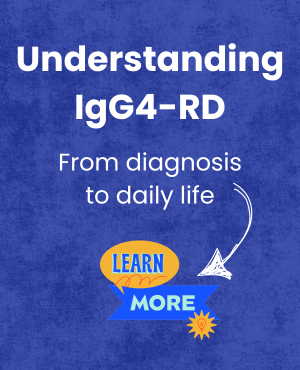Building your IgG4-related disease care team
Last updated June 2, 2025, by Kristin DeJohn

If you’ve recently been diagnosed with IgG4-related disease (IgG4-RD), an essential next step is building an IgG4-RD care team that can work together and keep your treatments on track.
Because IgG4-RD is a systemic, fibroinflammatory disease that affects multiple organs in 60% to 90% of those living with it, a multidisciplinary team is often required to treat it effectively.
Having a team of IgG4-RD specialists that communicates well can make a significant difference in helping you manage symptoms, avoid complications, minimize medication side effects, and track flare-ups before they cause significant damage.
The role of your primary care physician
IgG4-RD is often undiagnosed, untreated, or mistreated because people may not feel symptoms for years, or the symptoms vary and mimic other conditions.
Fortunately, primary care doctors are increasingly being trained to recognize IgG4-RD symptoms and may initiate the diagnostic process by ordering tests to rule out other conditions. If they suspect IgG4-RD, they will likely refer you to a rheumatologist for IgG4-RD.
Following diagnosis, your primary care physician will continue to play a role in your ongoing care. They may help monitor your overall health, manage any related conditions, and make sure all your specialists are aligned on your treatment plan.
They’re also often the first point of contact if new symptoms appear or if you need help navigating your care between specialist appointments.
Key specialists in IgG4-RD care
Rheumatologists typically lead IgG4-RD care teams because they are trained to treat inflammatory conditions.
Other IgG4-RD doctors can be added to your care team based on which organs are affected. Additional specialists may include:
- cardiologists
- dermatologists
- gastroenterologists
- hepatologists
- immunologists
- nephrologists
- neurologists
- ophthalmologists
- otolaryngologists
- pulmonologists
- urologists.
Your IgG4-RD care team may also collaborate with radiologists, pathologists, oncologists, surgeons, and other specialists, as the diagnosis and monitoring of IgG4-RD sometimes require laboratory tests, imaging, and biopsies.
Tips for building a supportive care team
Because most rheumatologists are trained to manage immune-mediated conditions like IgG4-RD, the best option for building a supportive care team may be to ask your primary care doctor for a referral to a rheumatologist.
If your rheumatologist is part of a larger medical center, there may be a built-in network of specialists. If not, ask your rheumatologist or team leader how the team works together and whether each specialist accepts your insurance.
You can also conduct your own research on specialists.
- The American College of Rheumatology maintains a rheumatology professional directory that allows you to search for IgG4-RD specialists.
- The advocacy group IgG4ward! Foundation also has a searchable physician network.
Once you have your care team in place, plan regular check-ins and be upfront about your symptoms, IgG4-RD treatment choices, and any concerns you have.
How your care team works together
Your care team will work together by sharing the details of your disease and all related symptoms. This will allow them to better tailor your treatment plan, including your medications and any potential surgeries or procedures.
Balancing medications
Of those who need medication to manage IgG4-RD, steroids are usually the first-line treatment. However, there may be some cases where steroids may not be the best treatment option.
For instance, if you have an inflamed pancreas, steroids may worsen its function, potentially leading to diabetes. In this case, your rheumatologist would work closely with your pancreatic specialist to monitor organ function and adjust your medications.
This type of communication extends to other specialists, depending on which organs are involved.
Making surgical decisions
If a member of your care team suspects surgery may be necessary to address an underlying complication, effective communication between your IgG4-RD specialists enables a quicker surgical response, especially in emergencies.
It may also lead to earlier IgG4-RD treatment with medications, which may prevent unnecessary and potentially damaging surgeries.
Coordinating appointments and information
Logging symptoms and keeping regular appointments is a good way to ensure you’re staying ahead of IgG4-RD. The more your doctors know about your symptoms, even if they seem minor, the better they can predict flare-ups or progression.
Keeping a basic journal to log symptoms and a calendar for appointments can be helpful. You can also ask your specialists to send your appointment summaries to your other care team members.
Being your own health advocate
Being your own health advocate starts with getting the most up-to-date information about IgG4-RD and having questions prepared for your IgG4-RD care team. Don’t hesitate to seek a second opinion, especially if your diagnosis is unclear or your symptoms aren’t improving.
The IgG4Ward! Foundation has a resource page that includes a support group. The organization has also joined forces with the Alliance for Patient Access to help remove barriers to treatments, such as cost.
Overall, tracking your progress, asking questions, and openly talking to your care team is the best way to take charge of your health and manage IgG4-RD.
IgG4-RD News is strictly a news and information website about the disease. It does not provide medical advice, diagnosis, or treatment. This content is not intended to be a substitute for professional medical advice, diagnosis, or treatment. Always seek the advice of your physician or other qualified health provider with any questions you may have regarding a medical condition. Never disregard professional medical advice or delay in seeking it because of something you have read on this website.
Recent Posts
- A chiropractor’s functional approach provides relief from my spine issues
- Genome study finds new genetic risk factors predicting IgG4-RD
- Rare IgG4-related GI disease often mistaken for stomach tumors
- With IgG4-RD, disease remission is a process toward progress
- Autoimmune conditions seen in 1 in 10 IgG4-RD patients: Study
